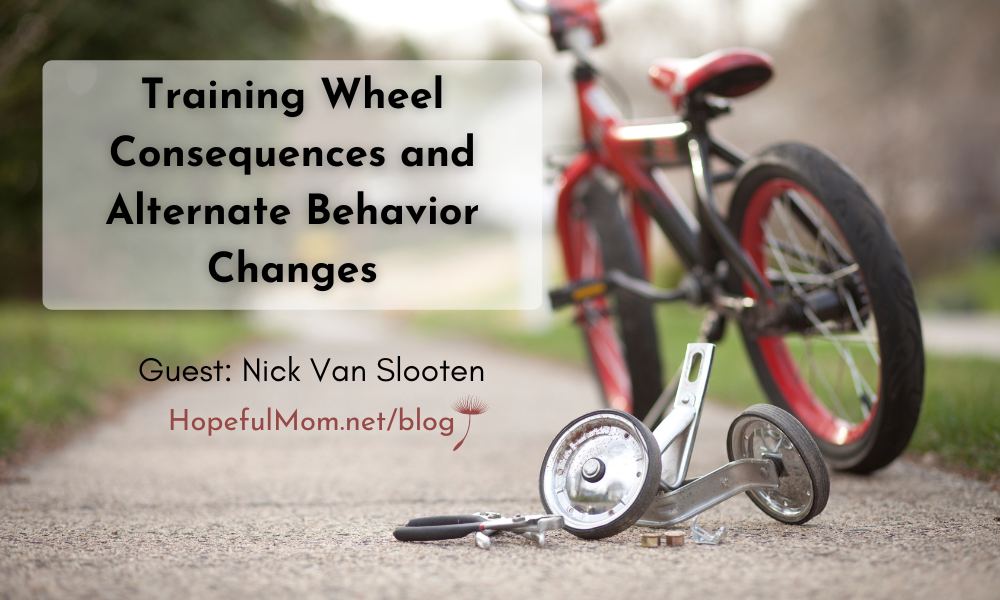Nick and I talked a few months ago about his app, Relay. He and his team designed this fairly-new app to help those trapped in pornography’s grip by teaming people up into support groups. I recommend you check it out. Nick’s enthusiasm and passion are contagious, so I’m thrilled that he agreed to write this post about training wheel consequences for you.
One reason raising children is so hard is that they often don’t internalize the link between cause and consequence. They don’t like their stomach to hurt, yet they still eat half their Halloween candy in one sitting. They don’t like to get sunburned, but they won’t let you lather sunscreen on before they run out to play. Because children have a hard time understanding the true impact of their actions, parents often create what I call “training wheel consequences”; let’s examine these consequences and consider how we can reframe them, particularly in the context of pornography habits, to help children make lasting behavioral change.
Example: Video Games
When a child breaks a rule — say, plays more than an hour of video games in one day — their parents may discipline them by taking away their video game console.
What is the real-world impact of playing more than an hour of video games in one day? On that day, essentially nothing. Perhaps the child will be more ornery for the rest of the evening or forget a homework assignment — relatively small consequences. However, the future impact of playing more than an hour of video games is potentially large and negative; the child may learn it is okay to play video games to excess and form a habit that crowds out formative relationships and more productive interests.
Children don’t see this possibility, but parents do, and as a result parents tend to institute negative consequences that are much more immediate and tangible (and far smaller than the potential real-world impact): training wheel consequences. Removal of the video game console is a prime example.
Let’s now consider the impact of this training wheel consequence. The child learns they can’t play video games for more than an hour or else the source of their entertainment will be removed. This may well help them avoid the long-term consequences of playing video games for more than an hour. However, children do recognize that training wheel consequences are artificially imposed; this may lead the child to resent their parents’ training wheel consequence, to leave and secretly play video games at friends’ houses where they can avoid the training wheel consequence, and potentially to play video games to excess as soon as they move out for college, once they’re “free” of the training wheel consequence.
How can parents help their children avoid destructive behaviors? Move from training wheel consequences to more productive methods with these four suggestions from Nick Van Slooten of Relay App. #hopefulmom #difficultconversations… Click To TweetIf Not Training Wheel Consequences, Then What?
If training wheel consequences can have an impact just as negative as not imposing any consequence, how can parents help their children avoid destructive behaviors?
Psychology suggests one answer: help children recognize the future consequences of destructive behavior and choose to avoid them (this applies to pornography habits and others). This is far more easily said than done, but here are a few suggestions:

- Avoid shaming in any form. This must be the cardinal rule to keep in mind before any parental intervention, because introducing shame into any interaction can engender trauma that actually perpetuates the destructive behavior.
- Enable your child to direct training wheel consequences. Consider which consequences you impose might be “training wheels” (e.g. taking away a phone). Talk with your child about it — perhaps apologize for imposing an artificial consequence, and explain that you wanted to help them. Ask them what they think would be an appropriate way for you as a parent-child team to respond to the destructive behavior instead of your chosen training wheel consequence.
- Help your child visualize a positive future with goal-setting. Encourage them to write down their top 3-5 goals for the person they want to become and help them ponder those goals regularly. Don’t tie this exercise to the behavior you want them to avoid — rather, focus entirely on the positive, and let them build their own vision for their life. Trust that your child will recognize the negative consequences of the destructive behavior and create a path to achieve their goals that does not include the behavior.
- Encourage reflection. As children reflect on their lives and actions, they are more able to link their behaviors with the consequences of those behaviors and find positive ways to cope with stressors. Journaling is a great way for your child to reflect in an unguided, self-directed way, though incentivizing journaling isn’t always easy. Coaching or counseling can be a more hands-on way to help your child reflect with another person in a more structured manner.
These are just a handful of ways you can help your child recognize and exercise their agency to avoid the future consequences of destructive behaviors rather than imposing artificial barriers yourself. The general principles are more important than the specific methods you use to implement, but above all, remember to avoid generating shame in your interactions with your child regarding their destructive behavior, as that will not solve but exacerbate the problem.
Relay App
A quick shameless plug — my team and I have worked hard to incorporate these principles into our pornography recovery app, “Relay – Improve Together.” We match teens and adults into support groups and provide a shame-free environment with daily opportunities for reflection and structured goal-setting. Feel free to download and join as a “supporter” to explore it yourself.
Conclusion
- Training wheel (artificially imposed) consequences can harm a child more than they help change behavior
- Instead, find ways to help your child recognize the consequences of destructive behavior and choose to avoid them
Thanks for reading. Which suggestion did you find most helpful?
Before you go, subscribe to Hopeful Mom below and follow Hopeful Mom on Facebook, Instagram, and LinkedIn.
About the author

Nick Van Slooten
Nick Van Slooten is the co-founder and COO of Relay, a support group app for people who want to overcome pornography habits and other compulsive behaviors. Nick is passionate about using learnings from psychology and behavioral economics to help people improve and reach their goals. He lives with his wife in San Francisco, and when he's not working, Nick loves to run, both to exercise and to explore.


